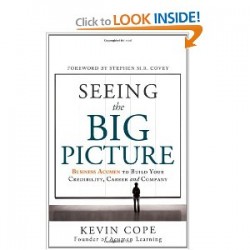Learning how to prioritize work projects isn’t something you pick up overnight. I was reminded of this when a friend reached out recently and was looking for information on how to make use of a very limited time frame and what equated to an endless list of projects.
How to Prioritize Work Assignments (Video)
In this short video (embedded below; subscribers need to click through to view) I discuss some of the keys to prioritizing work while keeping your managers and project stakeholders happy.
In case you weren’t making notes, those three key points in the video were:
- Setting deadlines (and asking for them)
- Getting manager feedback
- Communicating more often than normal
Nothing earth-shattering in the video, but you’d be amazed at how often the little things like this will make you look like an outstanding professional compared to those who don’t take the time to do this well.
CEO’s Speak Out on How to Prioritize Work
In a previous book review (Perform Like a Rock Star) I pointed out the results of a survey of numerous CEOs:
CEOs rate the top two qualities they say will help someone advance in their career quickly as:
1) the ability to separate the relevant from the irrelevant
2) the ability to get the job done quickly
So, in other words, being able to prioritize and do work quickly will (statistically) be something that your CEO would appreciate. Keep that in mind–it’s a skill you must develop.
How to prioritize work in HR
In the above examples I was talking about some fairly straight forward items. But I’d like to think that HR has a unique twist. How do you prioritize between a safety training class, conducting a sexual harassment investigation, recruiting for a key opening, and answering open enrollment questions?
Yeah, welcome to HR.
Let’s take a consulting role with an outsider’s perspective. Assuming no serious safety or critical legal issues, how do you prioritize work that is a big, jumbled mess? Check out this short paraphrased conversation I had with a friend this week for how I would start approaching a large number of competing priorities.
Hey, Ben. I am about to fly to an out of town location to meet with some of our remote HR people. The last time I spoke to someone in HR there, they indicated that help was needed in their recruitment, onboarding, health/safety, employee engagement and retention, etc. The trouble is that I don’t know where to begin since it sounds like EVERYTHING needs an update Any advice? -P-
It’s a fairly common problem in the HR field to have this sort of thing, so I tried to offer a valuable response without prescribing too much since I am making judgments from a thousand miles away.
This is such an amazing opportunity for you! Wow. The hard part, of course, is prioritizing the various needs and working on the highest impact items first. And how do you prioritize between recruiting, health/safety, and retention? That’s the real question.
Since you’re coming in from the outside, you’ll have to rely heavily on what the people on the ground know and think about the situation. Ask them what key area you need to start with and go from there. One of my favorite questions to ask in that scenario is “What is your biggest frustration with how things are going now? If we could wave a magic wand to change it, what would be the ideal outcome?”
Sometimes with that pair of questions you’ll hear them tell you exactly what you need to start with. It isn’t always that simple, but I’m amazed at how many times it’s worked for me. Most of the time it just takes the right person to ask the right question at the right time. And I think that’s your role in this!
You might also point them to some of the resources on this page. If they are serious about making improvements then I can guarantee they’ll find at least one idea for making positive change within their work group.
Let me know if that helps or if I can answer more. This is such an amazing opportunity for you and I can’t wait to hear how it goes.
Again, that’s my view from outside the organization, but I think it’s a safe place to start and still have the opportunity to get the local HR staff working in the same direction.
Do you have a specific method for how to prioritize work projects? How do you do it?

 I’ve been working with our business development team on a big project. The HR proposal portion is an amazing exercise, because it’s all about us forcing ourselves to quantify the impact that we have on the organization. Sitting there and discussing what differentiates our organization from others in terms of recruiting, retention, etc. opens your eyes to the opportunities that we have to drive change on a high level. It’s helping me to see that our part of the business can be as powerful (or not) as we want it to be.
I’ve been working with our business development team on a big project. The HR proposal portion is an amazing exercise, because it’s all about us forcing ourselves to quantify the impact that we have on the organization. Sitting there and discussing what differentiates our organization from others in terms of recruiting, retention, etc. opens your eyes to the opportunities that we have to drive change on a high level. It’s helping me to see that our part of the business can be as powerful (or not) as we want it to be.